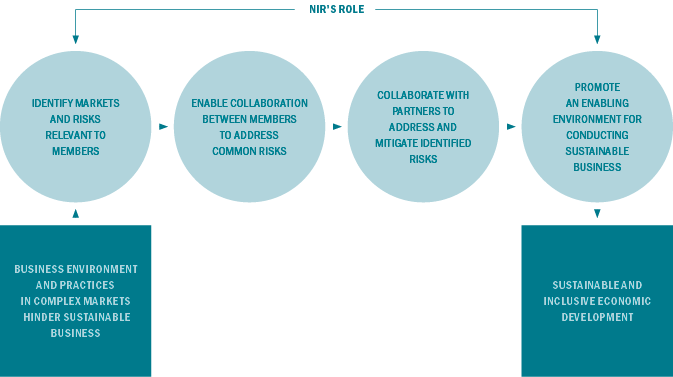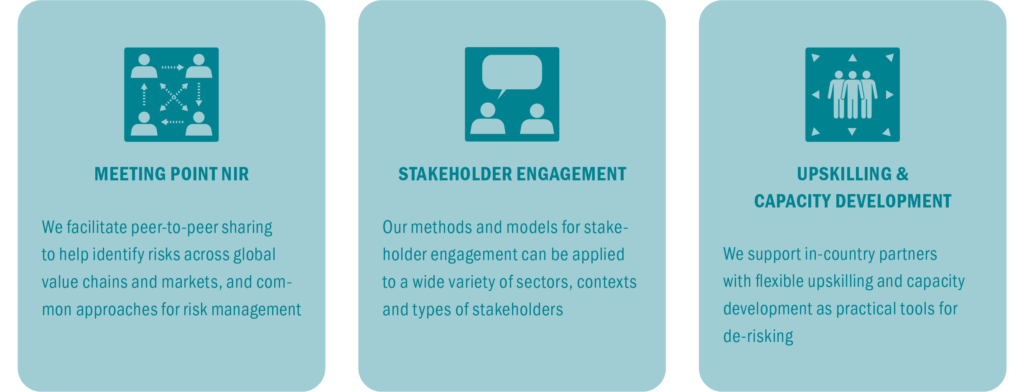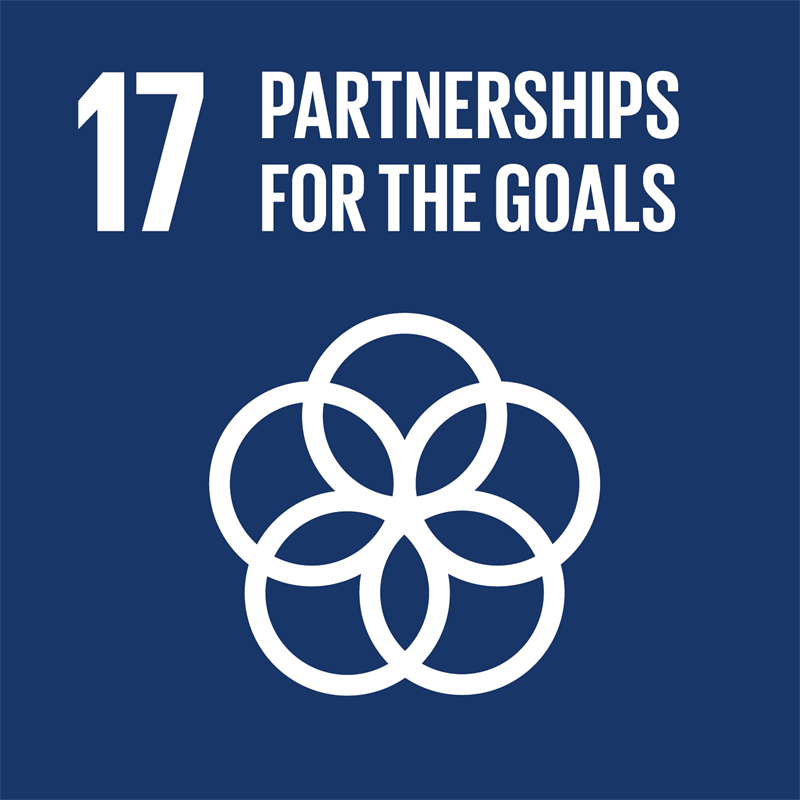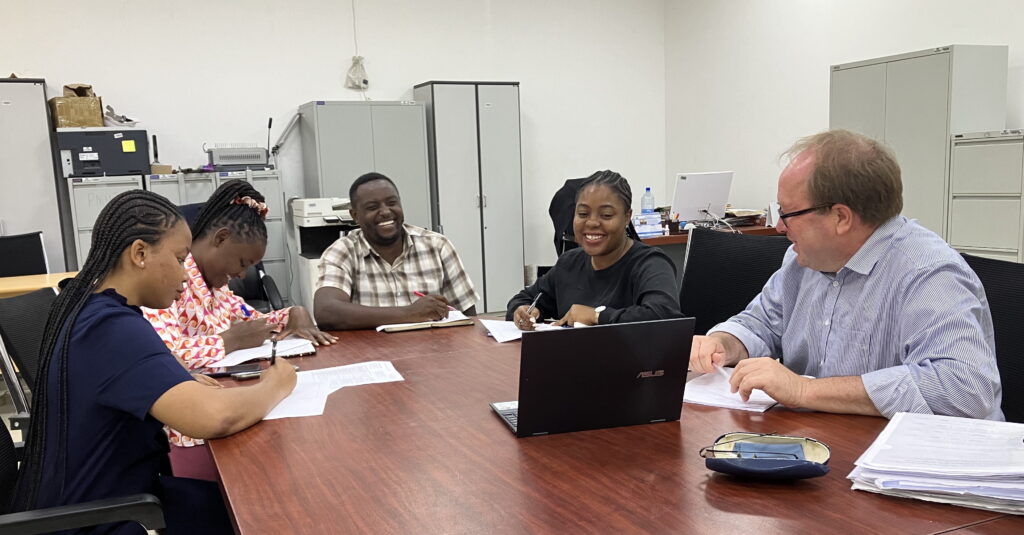Ung Thi Hien
Production Manager at Dayeon, Vietnam
““Managers and employees have
become working partners.”
In 2024, NIR navigated regulatory shifts and geopolitical uncertainty by focusing on collaboration, shared expertise, and supporting responsible business conduct. Explore how members connected, managed risks, and we supported our partners towards more sustainable and improved business conditions.
Identifying, analysing and developing strategic responses to future risks and opportunities was not an easy feat in 2024. Forecasting geopolitical events was quite similar to forecasting the weather – unpredictable at best. Meanwhile, regulations increased, as EU directives became more stringent in terms of human rights and environmental due diligence.
How can we best navigate these advancing times? At NIR, we believe that sharing perspectives and leveraging external expertise are key. Throughout 2024, we offered exactly that to our members, providing 47 unique opportunities to connect through Meeting Point NIR. We established two new member networks on circularity and human rights in the workforce, while the inaugural round of our Compliance Academy scored an impressive 4.7 out of 5. The year rounded off with our first Let’s Network, a cross- functional exchange on human rights in the workforce – including supplier, customer and compliance perspectives.
At our Annual General Meeting in April, 100 private and public partners celebrated what sets us apart. Namely the partnerships we foster at the nexus of aid and trade. We recognised that by working together – coordinating efforts while remaining flexible – Sweden becomes increasingly competitive, a proactive and engaged partner in low- and middle- income countries, creating jobs and wealth. A powerful tribute to the power of partnerships!
The potential of business to stimulate development is undeniable. When combined with Official Development Assistance, business becomes an even more powerful lever. Our newly developed framework on how to best support due diligence for responsible business conduct empowered this belief. Another important milestone during 2024 included the Swedish International Development Cooperation Agency’s (Sida) decision to upscale our partnership. This involved a significant increase of our support to in-country partners on decent work, sustainable investments and responsibility in mining in 19 low- and middle-income countries.
In 2025, we celebrate 65 years of supporting our members to monitor risks and navigate new frontiers. In an increasingly complex and fast-paced world – marked by division, multipolarity and the shift of policies toward protectionism – trade and investment may be hampered, impacting everyone. One more reason to foster and maintain strong and meaningful partnerships. Join us in 2025 as we unlock new opportunities and position your business for long-term success!
Improve business conditions in complex markets. We are a pioneering and purpose-driven non-profit organisation, owned and governed by our members. Our long-term goal is to improve conditions for doing sustainable business and promote sustainable and inclusive economic development in low- and middle-income countries. We use a joint approach – collaborations and partnerships – to manage risks and promote more responsible business conduct. The result? Better outcomes for people and planet.

By combining the responsible business conduct efforts of companies with a broader development agenda, we leverage efforts to promote labour and human rights along with environmental sustainability.
In 2024, we continued to develop our means of supporting and promoting due diligence for responsible business conduct in low- and middle-income countries.

A cornerstone of our organisation, Meeting Point NIR offer an effective way to build networks, strengthen dialogue, collaborate effectively and form partnerships. Many member exchanges are planned in advance, covering extensive topics and countries. We also arrange exchanges on request, often in response to a global or regional event affecting the business of our members. .
In 2024, we made significant progress by offering 47 opportunities to meet and exchange, uniting around 600 participants
No Data Found
No Data Found
Each Let’s Talk meeting focuses on specific topics and/or countries. Designed to support members by monitoring new opportunities, each meeting strives to position them for long-term business success and identify any potential risks. Leveraging external expertise is key to achieving this. In 2024, 70% of Let’s Talk speakers were sourced from outside our network.
The Compliance Academy offers a safe and inspiring space for peer-to-peer sharing, knowledge exchange on managing risks and challenges and an interchange on best practices. Networks are also built through the Academy, enabling members to benchmark the most effective approaches for responding to a rapidly evolving regulatory and risk landscape. Especially as compliance and sustainability increasingly intersect. Developed by a member-led task force including Saab, Scania and Electrolux, the Academy curriculum runs over the course of a year and features six training modules. The second series will begin in early 2025.
partcipants recommend the Academy to their colleagues
No Data Found
Our in-country partners include companies, trade unions and industry organisations in low- and middle-income countries that we support with capacity building, stakeholder engagement and upskilling. Our 2024 in-country partners included the Kenyan Association of Manufacturers, Amalgamated Union of Kenya Metal Workers, National Union of Metalworkers of South Africa, Guías Colombia, Colombian Mining Association, Sodeico, Tanzania Railways Corporation, Electricidade de Moçambique EP, Ministry of Internal Affairs of Ukraine, Inter-American Development Bank in Peru and Vietnam Electricity.
Team Sweden is a network of public organisations, authorities and companies that promote Swedish exports in close collaboration with Swedish embassies. Our toolbox complements the Team Sweden offer when and where we can contribute with added value. In 2024, we had extensive collaboration with Team Sweden, including Swedfund International, EKN, SEK, Business Sweden and the Swedish embassies in Abuja, Algiers, Bogotá, Buenos Aires, Dar es Salaam, Hanoi, Kyiv, Kinshasa, Lusaka, Manilla, Maputo, Nairobi, Santiago, Jakarta and Johannesburg.
As an implementing partner to Sida, our toolbox is a part of Sweden’s development cooperation. And as
a non-profit owned and governed by Swedish business, we are a nexus partner between our members and Sida. Enabling synergies between trade, promotion and development cooperation, our partnership with Sida means we can implement practical and demand-driven support to our in-country partners in low- and middle income countries. In 2024 alone, an increase in grants from Sida empowered us to scale up our support to in-country partners in 19 low- and middle-income countries.
By joining forces with implementing partners, we are granted a broader reach for executing our operational activities. Our 2024 implementing partners included Industrial and Metalworkers’ Union (IF Metall), Stockholm Environment Institute (SEI) and Centro Vincular Foundation at the Federico Santa Maria Technical University.
Our training partners are teams of experts delivering capacity development and upskilling to our in-country partners. Often sourced from the Swedish resource base, they provide essential skills and know-how. In 2024, we worked with 10 training partners and four special advisors with both technical and sustainability expertise.

“The SDGs can only be realized with strong global partnerships and cooperation. A successful development agenda requires inclusive partnerships — at the global, regional, national, and local levels — built upon principles and values, and upon a shared vision and shared goals placing people and the planet at the center.” SDG 17
In 2024, NIR deepened its engagement in Ukraine by launching activities aimed at strengthening business partnerships for reconstruction and sustainable development. Collaborating closely with Ukrainian business organizations, Swedish companies, and international partners, NIR focused on promoting transparent business practices, rebuilding industrial capacity, and supporting Ukraine’s integration into European value chains. This work contributes to long-term resilience and aligns with Sweden’s broader support for Ukraine’s recovery.
In 2024, we increased our engagement in DRC by specifically focusing on workforce skills and capacity building. We once again participated in DRC Mining Week, where the Swedish business delegation, supported by the Embassy of Sweden in Kinshasa, showcased innovative solutions for technical and vocational education. Our engagement with key stakeholders in the Katanga mining district later in the year highlighted persistent challenges in the mining sector. These include poor infrastructure, weak governance and an acute shortage of the technical, managerial and green skills required for sustainable mining operations. Along with our Congolese partner Sodeico, we hosted the 5th edition of Nkelo Bantu, the flagship multi-stakeholder platform within our Swedish Workplace Programme. Discussions focused on the skills gap as a critical barrier to the sustainable development of DRC’s mining sector. Key themes included the importance of aligning vocational training with industry demands, fostering collaboration between public and private sectors and addressing the unique needs of artisanal and small-scale miners.
After five years of implementation, companies, managers and employees across industries have undergone positive changes. An external evaluation conducted in 2024 indicates that results have reached beyond the workplaces. The companies we supported have become champions of responsible business conduct. By setting inspiring examples, they motivate other organisations and contribute to more secure and resilient value chains.
95% of our project partners find the programme relevant
No Data Found
71% believe the programme has contributed to improved conflict resolution
No Data Found
80% say that they managed to improve the relationship between workers and management
No Data Found
Stakeholder dialogue is a prerequisite for effective due diligence. Employees in the supply chain are an affected stakeholder group and are essential to include in the due diligence process, especially for companies with suppliers in low- and middle-income countries.
Engaging with supply chain employees can be a challenging task. Management may not grant access to employees, and if a chance is given to engage in dialogue with them, it can be difficult to determine if they feel safe enough to speak openly. This often stems from a lack of trust between managers and employees.
In Vietnam, we supported supply chain factories to set up collaboration committees for structured on-going dialogue between managers and employees. This serves to facilitate a workplace culture characterised by trust and open communication. When employees trust their managers and colleagues, they are more likely to voice ideas and concerns. Trust also plays a crucial role in reducing workplace conflicts. In a trusting environment, employees are more willing to address conflicts openly and to seek resolutions collaboratively. There is also a close link between trust in the workplace and job satisfaction, motivation and overall productivity.
After establishing representative collaboration committees between managers and employees, our partner factories reported a rise in employee ideas and concerns. They also observed increased employee engagement, reduced turnover and better collaboration between departments. However, the factories also faced challenges. A lack of real commitment from management and an inability to understand that dialogue is about creating meaningful change, not just a quick exercise to please buyers, proved difficult. Secondly, a big proportion of employ[1]ees are migrant workers, which involves high turnover rates and in turn threatens the dialogue structure. Lastly, the local norm of not speaking up also hindered engagement.
In 2024, our partner factories were invited to share good practices at several supplier events during the year. In total, they reached more than 50 suppliers in the garment, electronics and furniture sectors. At the UN Responsible Business and Human Rights Forum in Bangkok, we co-hosted a multi-stakeholder workshop on dialogue as a tool for effective due diligence and remedy. In Hanoi, we co-arranged a workshop with the Swedish Embassy, which included a panel discussion showcasing how dialogue rooted in trust and respect facilitates ongoing due diligence in the supply chain
When we launched in Colombia, we focused on establishing initial partnerships with Swedish industrial companies already located in Colombia. These companies are known for prioritising responsible business conduct in their agendas. We supported them to establish workplace collaboration committees for on-going dialogue between managers and employees. Our purpose was to provide employees with greater opportunities to be heard, influence policy and engage in daily improvements.
In an external evaluation, respondents from the participating companies expressed satisfaction with the new dialogue practices, describing it as relevant for both personal development and profitability.
We partnered with a Colombian think tank, Fundación Ideas para la Paz, to conduct a study based on five of our Swedish partner companies in Colombia. The cases were presented in multi[1]stakeholder sessions on how our method could be used in a broader context within the Colombian labour market. Participants included companies, government entities, trade unions and employers’ organisations, all of whom showed great interest in our method. Consequently, we now collaborate with the Ministry of Labour and the Javeriana University in Bogotá.
The Colombian government has ambitious plans to reduce the country’s reliance on fossil fuels, a cornerstone in the public economy. To ensure a green transition where employees, communities and businesses are all considered and supported during the shift, the government has emphasised the importance of social dialogue as a critical tool. We collaborated with the Ministry of Labour to develop a curriculum for a social dialogue school training both trade union and company representatives. We also collaborated directly with the energy sector through a partnership with the company Empresas Públicas de Medellín (EPM), one of the largest companies in Colombia. The partnership involves training managers and employee representatives in dialogue skills.
By exploring ways to scale our efforts, we ensure that more stakeholders can benefit from learnings and models for dialogue. In 2024, we initiated a collaboration with Javeriana University in Bogotá. Based on good practices from Swedish companies, we are developing a certified university course in dialogue, designed to equip Colombia’s future business leaders with essential skills in dialogue.
The SGR has already begun improving transport, increasing business efficiency and providing a faster and safer mode of transit for passengers. The potential for social and economic development inspired by the SGR is vast. In total, 2,500 kilometres of electrified railway are planned for, connecting the port of Dar es Salaam with Mwanza on the shores of Lake Victoria in Tanzania, extending beyond to Burundi, Rwanda, Uganda, Democratic Republic of the Congo and other countries in the region.
Infrastructural projects like the SGR offer Swedish companies substantial business opportunities. According to Business Sweden, there are approximately over 100 potential Swedish suppliers to railway projects of this size, making the SGR a strategic project for Team Sweden.
The group of international lenders for the Dar es Salaam to Dodoma stretch of the SGR require align ment with the environmental and social standards set out in the International Finance Corporation Performance Standards (IFC PS).
TRC aligning with higher sustainability standards benefits both the people and environment affected by the railway line. As a partner, we support those standards being achieved by offering practical tools, including flexible upskilling, capacity development and models for stakeholder alignment.
TRC’s capacity to manage environmental and social risks by upskilling TRC’s Environmental and Social Team members means that Swedish and other international financiers can invest in the railway. It also means that TRC has increased capacity to manage risks to the environment and communities, resulting in better outcomes for people and planet. Our partnership with TRC since 2021 has been adapted to the project cycle.
Our partnerships go beyond training by aligning project stakeholders, for example project owners/ partners, financiers and regulating agencies. The lack of stakeholder alignment is often one of the biggest challenges in large infrastructure projects, and can result in unintended scope changes, delays and increased costs. Effective stakeholder alignment results in proactive identification, resolving gaps that could pose sustainability risks to the project while helping keep project timelines on track. In 2024, we supported TRC to align with stake holders such as the Ministry of Finance, Ministry of Transport and the Office of the Attorney General

Mining has the potential to become a growth engine in Latin American economies. However, mineral extraction is accompanied by risks that negatively impact the environment and communities, with social conflicts being rooted in mining in many regions throughout Latin America. As Latin American companies strive to remain competitive in the global race for minerals, they must navigate the significant risks mining poses to human rights and the environment. Protecting these fundamental aspects is key for inclusive development.
While lithium extraction has the potential to contribute to job creation and improved infrastructure, it can also lead to conflict, potentially impacting local eco-systems and water resources. All while challenging the traditional economic activities of local communities.
Lithium is extracted from brine in salt flats in extremely arid areas of the High Andes. A large proportion of indigenous communities, whose well-being is closely linked to a healthy ecosystem, reside in these areas. Although large-scale production of lithium is only just getting underway in Bolivia and most provinces of Argentina, prior experience from Chile constitutes that transparency around water data is a key factor for forging trust between communities and mining operators.
Our implementing partner, the Stockholm Environment Institute (SEI), has developed a model for more inclusive water management to ensure that lithium production does not lead to negative social and environmental impacts. By producing and consolidating measurement data in a participatory manner transparent to all stakeholders, fairer and more constructive stakeholder dialogue is possible.
Working alongside involved companies, local authorities, communities and indigenous groups, we will contribute to developing and replicating the model across the region.
In 2024, we prepared for stakeholder dialogue in one of the Salta Province salt flats in Argentina. The first important milestone was to establish agreements between the lithium mining companies and provincial authorities for sharing water data.
Tel: +46 8-783 00 50
Visiting adress:
Klarabergsviadukten 70
BOX 13009, 10301,
Stockholm
Sweden
International Council of Swedish Industry 2024. All Rights Reserved.
This executive summary presents the findings from the study “Workplace Cooperation: Finding Practical Solutions in the Colombian Context,” conducted by the Fundación Ideas para la Paz (FIP). The study evaluates the added value of the Swedish Workplace Programme (SWP) dialogue and cooperation model within the Colombian labor market.
Throughout 2022, FIP dedicated efforts to thoroughly understand the SWP model, including its concept, foundations, implementation process, and contributions to the labor market. In 2023, FIP documented the experiences of three companies—SKF Latin Trade, Securitas, and Epiroc—that implemented the SWP model in practice. The study also included face-to-face workshops to gather feedback from various stakeholders including civil society, businesses, government, academia, and international cooperation. The findings suggest that the SWP model has the potential to strengthen labor relations, contribute to decent work, and resolve workplace conflicts in Colombia.
The case studies highlight the importance of collaboration between employers and workers to promote decent work and sustainable development in Colombia. They demonstrate that social dialogue facilitates worker participation in labor decision-making, enhances their representativeness, and promotes cooperation between employers and employees, thus improving labor relations and contributing to the well-being of both employees and companies.
The SWP model is particularly noted for improving workplace relationships and commitment to jointly finding solutions to challenges faced by workers and the company. It empowers workers, enhances leadership, and helps integrate business policies into daily practices, reducing the initial disconnect between management objectives and the day-to-day realities of workers. The study also highlights the model’s capacity to manage conflicts constructively, transforming the perception of conflict as an opportunity for improvement. Structured dialogues deepen understanding of the underlying causes of conflicts, fostering empathy and facilitating effective resolution. This promotes a culture of collaboration and a democratic approach to decision-making, building trust.
Additionally, the model is recognized for enabling workers to make decisions, identify challenges, and propose solutions that impact their well-being, and bridging gender gaps in the workplace. Its inclusive approach adapts to the unique needs and characteristics of each company, promoting a stronger and more diverse organizational culture. It also drives good work performance and productivity by involving workers in problem identification and resolution, as well as in implementing improvements and efficiently identifying ESG (Environmental, Social, and Governance) risks for companies.
The document identifies the SWP model’s added value in empowering direct interaction among labor stakeholders in Colombia, overcoming historical or cultural reservations, and contributing to the development of stronger labor relations and improved workplace environments in the country.
Challenges and opportunities of the model are also discussed. The study points out the importance of addressing value chain risks, particularly in a global context where corporate clients demand decent work processes and due diligence. It emphasizes the need to integrate SMEs into this process and use anchor companies as drivers of social dialogue throughout the value chain. The role of the state in social dialogue and the importance of highlighting the benefits of the model for adoption across various business sectors are discussed.
The opportunities of the model include raising awareness of human rights in the workplace in line with the United Nations Guiding Principles (UNGP), to strengthen due diligence, manage risks, promote long-term sustainability, and improve organizational culture. The document also underscores the importance of involving workers in change processes, leveraging their insights for continuous improvement of processes, and fostering innovation opportunities. Lastly, it suggests replicating the model in value chains to address work environment risks and gender biases, involving suppliers and contractors, and integrating the model into corporate policies to strengthen existing programs and transform organizational culture towards resource efficiency and effective participation of employers and workers.